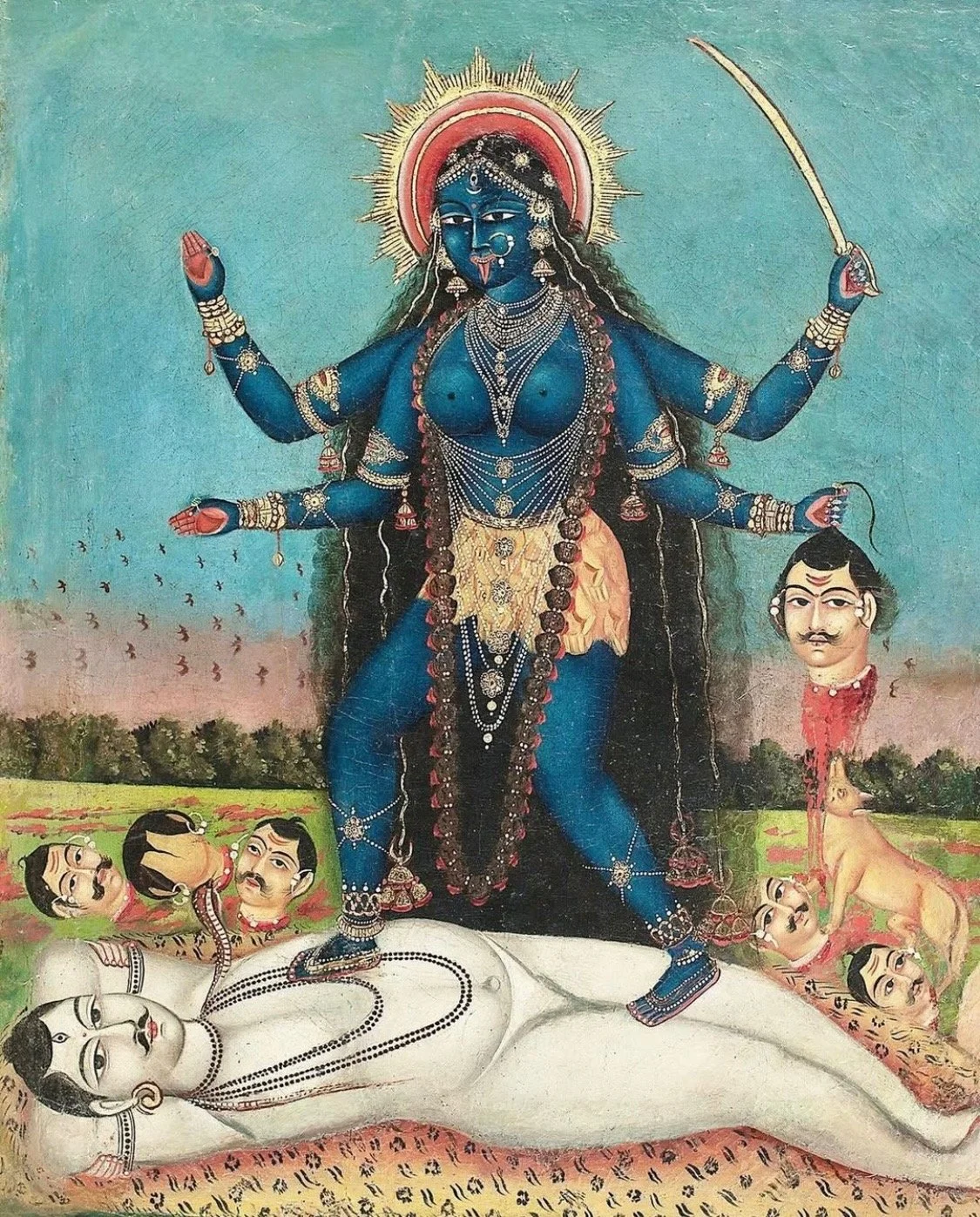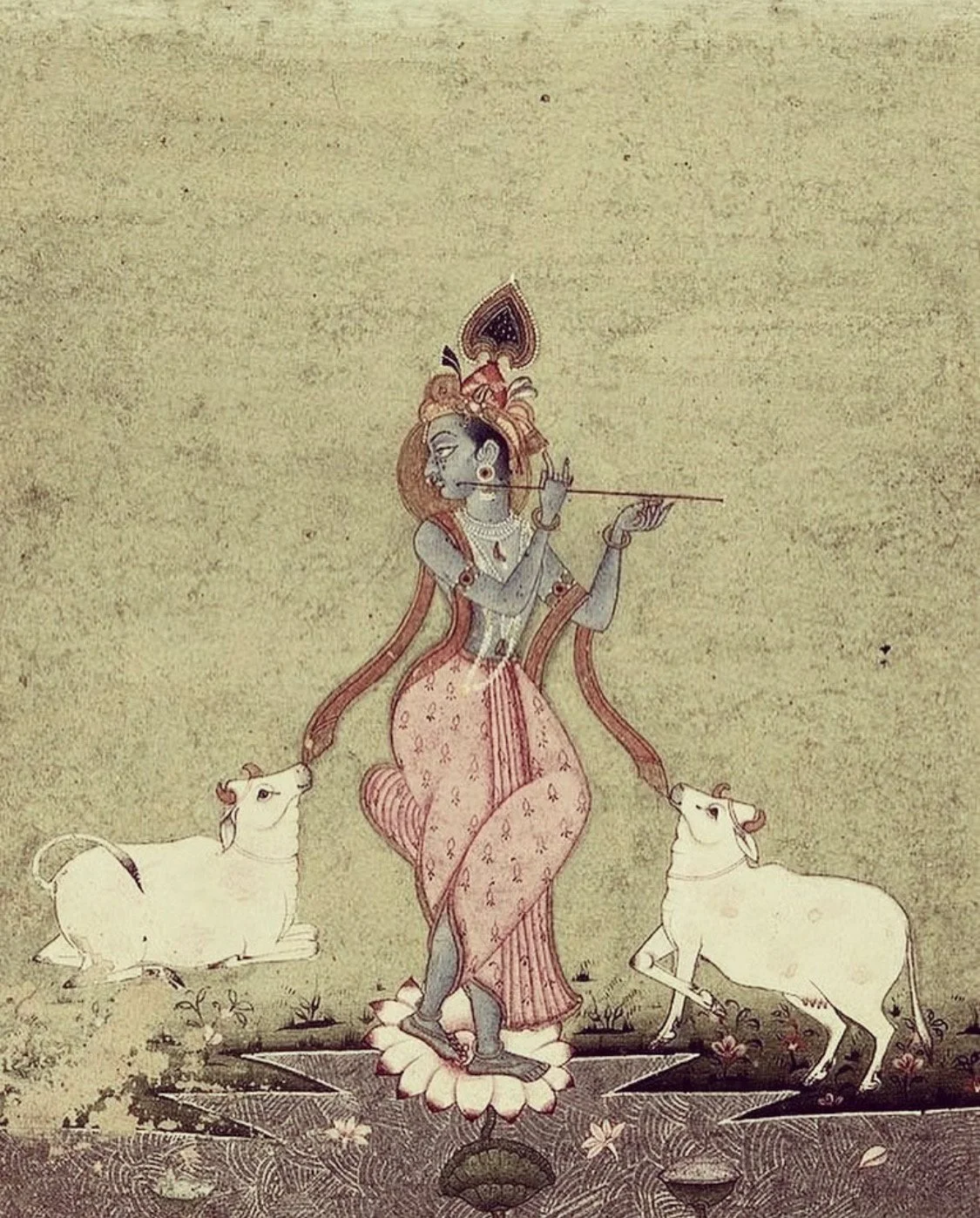KṚṢṆA KĀLĪ
On the aṣṭamī tithi (8th lunar day) of the dark fortnight (kṛṣṇa pakṣa) — reckoned as Śrāvaṇa in the South and Bhādrapada in the North — two auspicious observances converge: Śrī Kṛṣṇa Janmāṣṭamī and Kālī Jayantī.
Janmāṣṭamī marks the divine appearance of Śrī Kṛṣṇa, the avatāra of Viṣṇu who embodies love, play, and dharma’s restoration. On this same lunar day, the dark and liberating Mother, Mahākālī, conected to Śani Dev (Saturn) is also especially honored. Her Jayantī reminds us of the force that severs illusion, awakens truth, and grants fearlessness.
The alignment of these two — Kṛṣṇa’s enchanting sweetness and Kālī’s uncompromising power — offers a rare doorway into wholeness: the union of tenderness and strength, play and destruction, love and liberation.
Kālī, adorned with the munda-mālān (garland of severed heads), is the slayer of ego and illusion. Each severed head is a Sanskrit letter, showing that She devours the very roots of false identity—sound, speech, and thought—transforming them into ornaments of wisdom.
Her teaching is fierce: She strips away every veil until only the Self remains. To the ego, She is terror; to the soul, She is freedom. Naked, unbound by space or time, She reveals that clinging to what perishes is bondage, and resting in awareness is liberation.
Her stance upon Śiva is the union of opposites: movement anchored in stillness, time held by eternity. Śakti grounds in Śiva, showing that power without consciousness is chaos, and consciousness without power is inert. Together they awaken balance—the rhythm of creation, dissolution, and liberation.
Her connection to Kṛṣṇa is profound. Both embody the mystery of Time (kāla-svarūpa). Kālī, the dark Mother, consumes all forms back into Herself. Kṛṣṇa, the dark Beloved, enchants all beings toward Him. In the Gītā, He declares: kālo’smi loka-kṣhaya-kṛt pravṛddho—“I am Time, destroyer of worlds.” Both wear the hue of infinity (śyāma varṇa), not as absence, but as the womb of creation.
Like Kṛṣṇa, She is Time itself—dark, infinite, and irresistible. He enchants the soul through love, encouraging in the direction of right action (yoga-sthaḥ kuru karmāṇi); She liberates the soul through fearlessness, slaying the false self so the infinite may shine.
Kālī is truth without compromise; Kṛṣṇa is truth through love. One cuts, the other draws near—but both dissolve the ego and awaken the eternal Self.
कालीं कृष्णं नमाम्यहम् ।
Kālīṁ Kṛṣṇaṁ namāmyaham.
“I bow to Kālī, I bow to Kṛṣṇa—Dark Mother, Dark Beloved—forms of the one eternal.”
योगस्थः कुरु कर्माणि सङ्गं त्यक्त्वा धनञ्जय।
सिद्ध्यसिद्ध्योः समो भूत्वा समत्वं योग उच्यते॥ २.४८॥
yoga-sthaḥ kuru karmāṇi saṅgaṁ tyaktvā dhanañjaya |
siddhy-asiddhyoḥ samo bhūtvā samatvaṁ yoga ucyate || 2.48 ||
“Established in yoga, perform your action, O Dhanañjaya (Arjuna),
abandoning attachment, remaining equal in success and failure.
Such equanimity is called yoga.”
Bhagavad Gītā (2.48)



